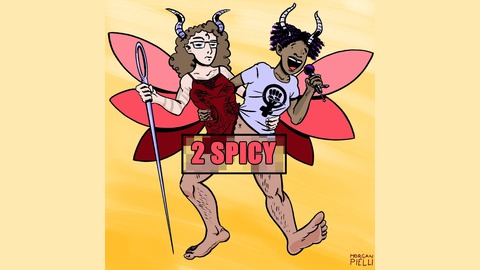How to start your own (funny) podcast: the 8 things you need

Elsa Waithe is a comedian, activist, and all-around wildchild. Her comedy is a mix of light-hearted but critical jabs at homosexuality and race but mainly herself and weed. She can been seen as a regular performer (and producer) at the Cinder Block Festival and in her feature on an episode of the This American Life podcast. She is also an instructor and incredible supporter of GOLD Comedy!
My then-partner and I launched our podcast, 2 Spicy, as a response to her being laid off, and my constantly getting 30-day bans from Facebook. We wanted do a joint project that highlighted news and activism and amplified voices on the left in an effort to push those in the middle further leftward. That’s all we had when we started: an idea, and time. We had no equipment, experience, or money. But we did have lots of FRIENDS—and tons of questions. Our first step was to reach out to our network and ask them EVERYTHING.
So now, I’m here to tell you what we learned—by asking and by doing—so that you, too, can start your own podcast. Here are the top things you need.
A topic and a take.
The idea of the podcast was to discuss some of the things that would get me banned from Facebook. We both had really strong ideas and opinions on the world and wanted a way to communicate them other than social media. We’d always been told by the folks around us that they really valued our opinions. In deciding your brand/topic, look toward your interests and hobbies. Surely there’s nothing new under the sun, so don’t be discouraged if there’s already a podcast that deals with your chosen topics. No one can talk about it in the way you do. Humor keeps your listener engaged, it doesn’t need to be goofy or campy to be funny. It just has to be interesting, and the more complex and niche, the better. You want to talk about sports? Then talk about something specific, like worst football fumbles. Politics? Maybe funny speech flubs. Try recurring segments. Have listeners write in. Humor can spring from your personality, your rapport with your co-host or anywhere.
A good partner.
As a creative couple we’d always wanted to do a project that combined our talents. Mine, speaking and humor. Hers, thoughtful analysis. We were told before we started the podcast that we wouldn’t make a good podcast because we “agree too much.” We posit that good podcast partners need not agree on every topic nor do they need to argue all the time. It’s more about good on-air chemistry and banter.
Equipment: free and crowdfunded/donated.
It is entirely possible to start a podcast with zero dollars. We reached out to our community about helping us record and someone with podcasting experience volunteered to bring his equipment to our apartment. After releasing a couple of episodes and receiving positive feedback, we knew we wanted to be able to record more often without having to wait for someone to come from the other side of Brooklyn. We found out what basic equipment we needed and made an Amazon wishlist, totaling a little over $400. The basic equipment needed was a Zoom recording device, 2 microphones with mic stands and an SD card. Within a few weeks all items were either purchased for us or donated to us..
Research and prep.
Our podcast focused on current news and trends so our research involves following the news, watching trending topics on social media, and whatever fun/interesting/scary articles we come across during the week. We compile 6 to 8 topics, the points we’d like to discuss about said topics and try to order them in a way that will flow on-air. There’s no scripts, just a pre-planned outline. We like to be able to flow as the convo grows organically.
A platform.
Of course the main platform is iTunes. But not everyone is jazzed about Apple products so we are also on BuzzSprout and Stitcher. We don’t use it, but there’s also SoundCloud. These are places where it is free to host your podcast but there are also services where you’d pay. We’ve heard good things about BlogTalkRadio and PodBean. And, of course, there’s always the chance that you’ll be picked up by a larger podcast “stable” like Maximum Fun or American Public Media.
Promotion.
We promo’d the podcast across the three major social media platforms: Facebook, Twitter and Instagram. The drawback to Facebook is that you’ll need to spend a little money to promote your posts due to their algorithms. We also started making clips of the more interesting sections of each weeks episode and releasing them as video teaser clips which are then released on Instagram and YouTube. Plus we had a Patreon that we direct our listeners to so that they can support the show and get exclusive goodies. And you can always develop tie-in merch—like our idea for 2 Spicy Habanero Sauce. Tune in to our podcast while you put it on…everything!
